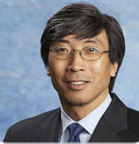 mobihealthnews recently caught up with Dr. Patrick Soon-Shiong, chairman of the Life Sciences Prize Group Steering Committee at the X Prize Foundation, and the newly appointed executive director of the UCLA Wireless Health Institute. Soon-Shiong is also founder and chairman of Abraxis BioScience and executive chairman and CEO of Abraxis Health.
mobihealthnews recently caught up with Dr. Patrick Soon-Shiong, chairman of the Life Sciences Prize Group Steering Committee at the X Prize Foundation, and the newly appointed executive director of the UCLA Wireless Health Institute. Soon-Shiong is also founder and chairman of Abraxis BioScience and executive chairman and CEO of Abraxis Health.
The Wireless Health Institute (WHI) was established last year as a community of UCLA experts from engineering, medicine, nursing, pharmacology, public health and other disciplines that aims to improve "the timeliness and reach of health care through the development and application of wireless, network-enabled technologies integrated with current and next-generation medical enterprise computing."
Soon-Shiong explained that the Institute's mandate is to not only enable the development of these technologies but also to foster wireless health start-ups and test the wireless health technologies to prove their efficacy.
"I believe the only way we can truly transform healthcare is if we enable both patients and providers to have access to data that is truly 'outcomes actionable,'" Soon-Shiong said. "Evidence-based, outcomes-driven data at the point-of-care is the goal. Those few words have a deep meaning to them -- evidence-based outcomes based point-of-care. That is the holy grail for healthcare transformation."
"On a personal level, my concern is that how we pursue care and drug discovery and all that today, is going to lead us down a path of diminishing returns," Soon-Shiong said. "We need to take advantage of the interfacing of some of these very exciting next generation technologies. Those include microfluidics, nanofluidics... as well as wireless technologies."
Soon-Shiong explained that UCLA's Wireless Health Institute presents an opportunity for the innovators behind many of those next generation technologies from various disciplines in conjunction with the UCLA's business school's leaders to come together to push the agenda of healthcare transformation.
The opportunities to push for that change are manifold.
"There is an urgent need to increase medication adherence," Soon-Shiong explained. Many studies have shown that getting patients to take their medication as directed can have a significant effect on their outcomes as well as on overall healthcare costs.
"No tools exist [in the market] today to measure compliance in real time," Soon-Shiong said. "There are no tools today that provide a service that allows you to intervene and modify patient behavior in real-time to actually encourage caregivers and patients to increase their compliance rates closer to 80 percent or 90 percent."
"I believe wireless technology will enable the breakthrough that brings about such a real time compliance service that can let caregivers know who is taking what and when," Soon-Shiong said. (He may have had Proteus Biomedical in mind. Maybe.)
Soon-Shiong also noted a few other wireless health technologies he thinks encapsulates the potential of the technology: wireless biometric devices; sensors that can help detect developing foot ulcers before diabetics realize they are getting them; "smart" canes that use accelerometers to notify caregivers a patient may soon fall; and a wireless lens-less microscope that can use a phone's camera for some diagnostics.














